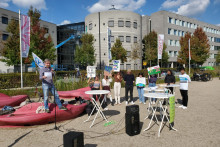A week ago a student stopped with his studies because he deems that the UT is doing to little to counteract climate change. The Shell excursion was also disrupted. What is the Executive Board’s view on this?
‘I am not suprised that this lives so intensely within the community. We see, know and feel that this is a hot topic. Many students and staff are making themselves, which shows how big and complex the problem is and that it deserves an approach that seeks connection. Lots of things are happening, but the main question is how we are going to accelerate the transition process. Many of our scientists are engaged with that and feel that urgency.’
Blocking an exercusion and a student who stops are not really examples of a dialogue.
‘The student made a tough choice, one can only be empathetic towards that. He writes that he is looking for a way in which he can put himself to use to combat climate change. That is also the message he leaves us with. We invite everyone for a dialogue and would like to hear in which way we can expand and accelerate our work against climate change. We also organize a lot for that and there are various bodies which one can join.'
(Text continues under the picture.)

Scientists are speaking out with increasing ferocity and join fanatical action groups. Does the Executive Board support this?
‘We have nothing but encouragement to let the sound of science be heard. Such can be done in many ways, but we advise to always do so in dialogue.’
In the two aforementioned examples the fossil fuel industry – with Shell at the forefront – are designated as the culprits. The UT should cut ties with Shell. Will that happen?
‘We have answered that before: we desperately need these parties to achieve the desired change. If we want to accelerate the transition, than we need connection. With both small and large parties, regionally, nationally and internationally. With innovation and leadership. This also implies the need for a connection with parties like Shell who want to fulfill a large role within the transition. The manner in which we collaborate is also of great importance to us. It must go hand in hand with our academic values.’
Listing Shell as a partner in the transition is seen as greenwashing by critics. Moreover, Shell has already been reprimanded for that on several occasions.
‘It is clear that Shell also has a long way to go before they can realise the grand ambitions that lie ahead. But in order to bring about a considerable change acting together works better than severing ties, in our opinion. Else you lose each other and the conversation to actually get something done is lost. The same goes for the student’s suggestion you mentioned to declare a climate emergency. We agree that it is urgent. But if you take that step, other things come into play which make the dialogue disappear.’
What is the scope of the collaboration between the UT and Shell?
‘We are currently evaluating the extent of that cooperation, although we do not have the impression that it is very large. It is no longer a foregone conclusion that every student wants to work at Shell. We observe that they are making deliberate choices for which company they want to work.’
The departed student suggests six concrete action points. We have mentioned two, but what is your view on his remaining action points? Will you include them in the UT’s policy?
‘The student proposes relevant points, part of which are already taking place. Ofcourse there is also room for improvement. Students and staff provide input regarding policy-making at the UT through various bodies. We as Executive Board, but also other colleagues, are approachable and show ourselves on campus. We are aware that we cannot do it by ourselves and call upon everyone to think with us. Let us not forget that a lot of things are already happening regarding the energy transition. Also among students. Take the master-insert Shaping Responsible Futures, which received the Higher Education Subsidy this year, but also countless students who incorporate existing problems regarding climate change through challenge-based learning. We as UT can contribute greatly in this way, but only by talking about it together. And above all by acting on it.'






